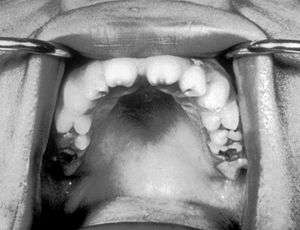Oral manifestations of systemic disease
Oral manifestations of systematic disease are signs and symptoms of disease occurring elsewhere in the body detected in the oral cavity and oral secretions. High blood sugar can be detected by sampling saliva.[1] Saliva sampling may be a non-invasive way to detect changes in the gut microbiome and changes in systemic disease. The association between the salivary microbiome and with Polycystic Ovarian Syndrome has been characterized. "[S]aliva microbiome profiles correlate with those in the stool, despite the fact that the bacterial communities in the two locations differ greatly. Therefore, saliva may be a useful alternative to stool as an indicator of bacterial dysbiosis in systemic disease."[2] Another example is tertiary syphilis, where changes to teeth can occur.[3] Syphilis infection can be associated with longitudinal furrows of the tongue.
| Oral manifestations of systemic disease | |
|---|---|
 | |
| Hutchinson teeth of congenital syphilis. | |
| Specialty | Oral and maxillofacial surgery |
| Differential diagnosis | Polycystic Ovarian Syndrome |
Tongue
Mineral and vitamin deficiencies can cause the tongue to appear beefy red and feel sore. Those deficiencies are iron, folate, and vitamin B12. A hairy tongue may be an indication of Epstein Barr virus infection and is usually seen in those infected with HIV. Other systemic diseases that can cause the tongue to form aphthous ulcers are: Crohn's disease and ulcerative colitis, Behcet's Syndrome, pemphigus vulgaris, herpes simplex, histoplasmosis, and reactive arthritis.[4]
References
- Nascimento, Marcelle; Goodson, J. Max; Hartman, Mor-Li; Shi, Ping; Hasturk, Hatice; Yaskell, Tina; Vargas, Jorel; Song, Xiaoqing; Cugini, Maryann; Barake, Roula; Alsmadi, Osama; Al-Mutawa, Sabiha; Ariga, Jitendra; Soparkar, Pramod; Behbehani, Jawad; Behbehani, Kazem (2017). "The salivary microbiome is altered in the presence of a high salivary glucose concentration". PLOS ONE. 12 (3): e0170437. Bibcode:2017PLoSO..1270437G. doi:10.1371/journal.pone.0170437. ISSN 1932-6203. PMC 5331956. PMID 28249034.
- Lindheim, Lisa; Bashir, Mina; Münzker, Julia; Trummer, Christian; Zachhuber, Verena; Pieber, Thomas R.; Gorkiewicz, Gregor; Obermayer-Pietsch, Barbara (1 January 2016). "The Salivary Microbiome in Polycystic Ovary Syndrome (PCOS) and Its Association with Disease-Related Parameters: A Pilot Study". Frontiers in Microbiology. 7: 1270. doi:10.3389/fmicb.2016.01270. PMC 4996828. PMID 27610099.
- https://www2a.cdc.gov/stdtraining/ready-to-use/Manuals/Syphilis/syphilis-notes-2013.pdf
- "The Tongue in Diagnosis - Stanford Medicine 25". Stanford University. Retrieved 7 May 2017.